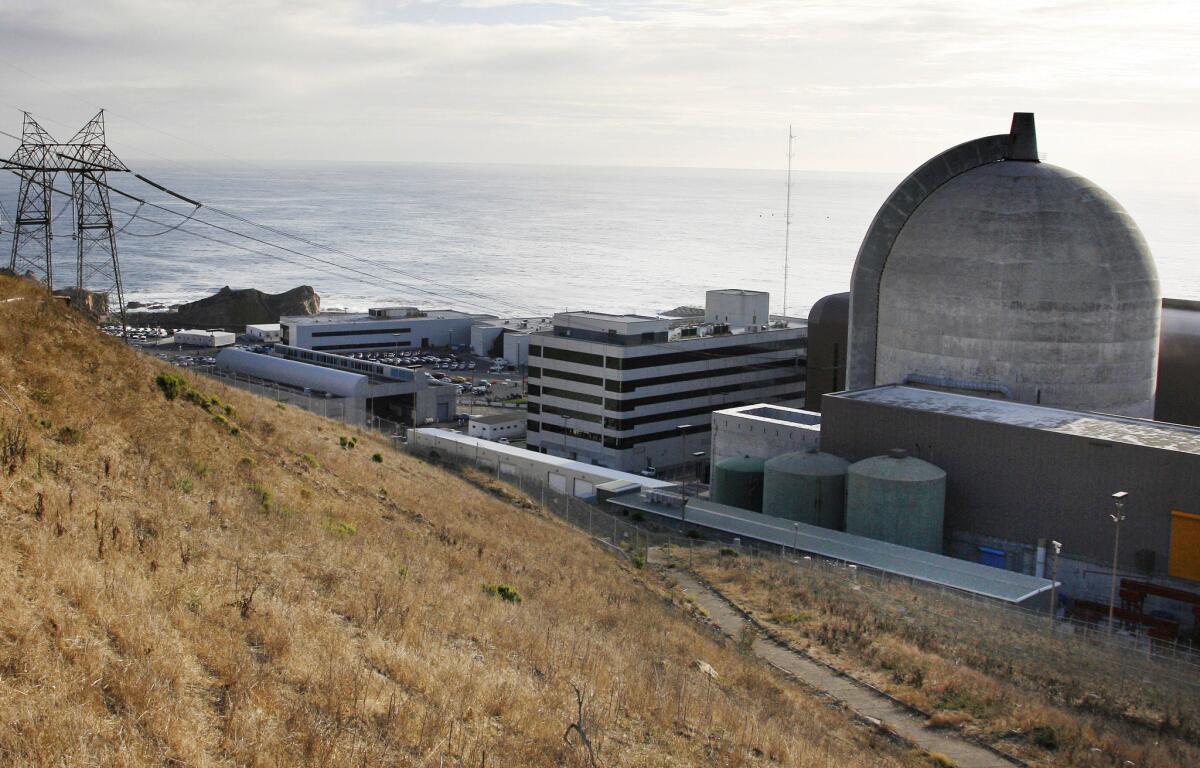Diablo Canyon nuclear plant safe in earthquakes, PG&E says in report

- Share via
California’s last remaining nuclear power plant can safely withstand earthquakes, tsunamis and flooding, according to documents submitted by the owner of the Diablo Canyon plant to the federal Nuclear Regulatory Commission.
Pacific Gas & Electric officials said this week that the company had submitted new documentation ordered by the regulatory agency in the aftermath of the 2011 disaster at the Fukushima Dai-Ichi nuclear plant in Japan.
The agency called on all U.S. commercial nuclear power plants to perform the reviews.
“These updated findings are the culmination of years of study and analysis, and further confirm the safety of the plant’s design,” Ed Halpin, senior vice president and chief nuclear officer for PG&E, said in a statement.
Jearl Strictland, director of technical services for Diablo Canyon, said the testing also took into consideration the effect a quake on one fault would have on the other three fault lines in the area.
Even under that scenario, he said, the plant could sustain the considerable ground motion that would be generated.
“The plant would be safe in conditions a substantial margin above what the design input is,” Strictland said.
The Diablo Canyon nuclear plant, built against a seaside cliff near Avila Beach in San Luis Obispo County, provides electricity for Central and Northern California.
The only other nuclear power plant in the state, San Onofre in San Clemente, was closed in 2013 after a tube in the plant’s newly replaced steam generators sprung a leak and released a small amount of radioactive steam.
The reports submitted to the Nuclear Regulatory Commission will be reviewed to determine if policies or licensing needs to be changed.
In Fukushima, an offshore earthquake triggered a tsunami that swamped the plant, knocked out its power systems and led to a loss of coolant. The crippled plant still leaks radiation into the sea, the San Francisco Chronicle reported.
In a separate matter from the report to the federal agency, PG&E officials said the Diablo Canyon plant is safe from quake hazards even after the reactor vessel heads and steam generators were replaced from 2008 to 2010 without first being tested for safety in a potential quake on the Hosgri Fault and a simultaneous loss of cooling water in the reactors.
The Hosgri Fault is three miles from Diablo Canyon and was discovered in 1971, three years after construction began.
“While the probability of such an event occurring is infinitesimally small, engineering and seismic experts performed a subsequent evaluation and confirmed there is sufficient margin in the component’s design to withstand a combined earthquake on the Hosgri fault and a loss of coolant accident,” PG&E spokesman Blair Jones said in a statement.
The Friends of the Earth environmental group has a case pending in the U.S. Court of Appeals in Washington, D.C., claiming the Nuclear Regulatory Commission illegally allowed PG&E to amend the seismic licensing basis for Diablo Canyon, hiding that the reactors are vulnerable to surrounding earthquake faults capable of ground motion stronger than the plant was designed to withstand.
“The point is this [is] absolutely critical equipment to a nuclear reactor, yet it was designed and installed using the wrong data,” said Damon Moglen, senior strategic advisor for Friends of the Earth. “That’s a major licensing violation, and the NRC should have come down like a mountain of bricks.”
A federal judge rejected efforts by PG&E and the agency to dismiss the lawsuit.
The lawsuit draws on a report filed in 2013 by the former NRC resident inspector stationed at Diablo Canyon, Michael Peck, who urged regulators to shut down the plant until they could determine whether its twin reactors could withstand powerful shaking from the nearby faults.
For Central Coast news, follow @amcovarrubias.
More to Read
Sign up for Essential California
The most important California stories and recommendations in your inbox every morning.
You may occasionally receive promotional content from the Los Angeles Times.











